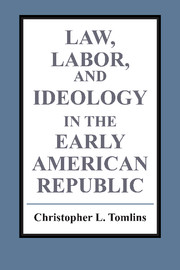Book contents
- Frontmatter
- Contents
- Preface and acknowledgments
- Prologue: two moments of the republic
- PART 1 LAW AND THE FACTS OF AMERICAN LIFE
- 1 Law: the modality of rule
- 2 Police: the pursuit of happiness
- 3 An excess of democracy
- PART 2 LAW, LABOR, AND STATE
- PART 3 LAW, AUTHORITY, AND THE EMPLOYMENT RELATIONSHIP
- An interlude: on law and economy
- PART 4 THE NEW INDUSTRIAL ORDER
- Epilogue: “free Ameriky”
- Index
2 - Police: the pursuit of happiness
Published online by Cambridge University Press: 05 August 2012
- Frontmatter
- Contents
- Preface and acknowledgments
- Prologue: two moments of the republic
- PART 1 LAW AND THE FACTS OF AMERICAN LIFE
- 1 Law: the modality of rule
- 2 Police: the pursuit of happiness
- 3 An excess of democracy
- PART 2 LAW, LABOR, AND STATE
- PART 3 LAW, AUTHORITY, AND THE EMPLOYMENT RELATIONSHIP
- An interlude: on law and economy
- PART 4 THE NEW INDUSTRIAL ORDER
- Epilogue: “free Ameriky”
- Index
Summary
But where say some is the King of America? I'll tell you Friend, he reigns above, and doth not make havoc of mankind like the Royal brute of Britain. Yet that we may not appear to be defective even in earthly honours, let a day be solemnly set apart for proclaiming the charter; let it be brought forth placed on the divine law, the word of God; let a crown be placed thereon, by which the world may know, that so far as we approve of monarchy, that in America THE LAW IS KING. For as in absolute governments the King is law, so in free countries the law ought to be King; and there ought to be no other. But lest any ill use should afterwards arise, let the crown at the conclusion of the ceremony be demolished, and scattered among the people whose right it is.
Thomas Paine, Common SenseConsider police. The word is hardly a stranger. Policing is an essential component of the institutional architecture of contemporary society, and American historians have devoted much energy to its origins and development. Paradoxically, however, that energy has created a series of obstacles to a successful recovery of police in its original incarnation as a key term of political discourse. What historians have traced is the genealogy – and principally an institutional not a conceptual genealogy at that – of what police has become in the years since the middle decades of the nineteenth century.
- Type
- Chapter
- Information
- Law, Labor, and Ideology in the Early American Republic , pp. 35 - 59Publisher: Cambridge University PressPrint publication year: 1993
- 2
- Cited by



